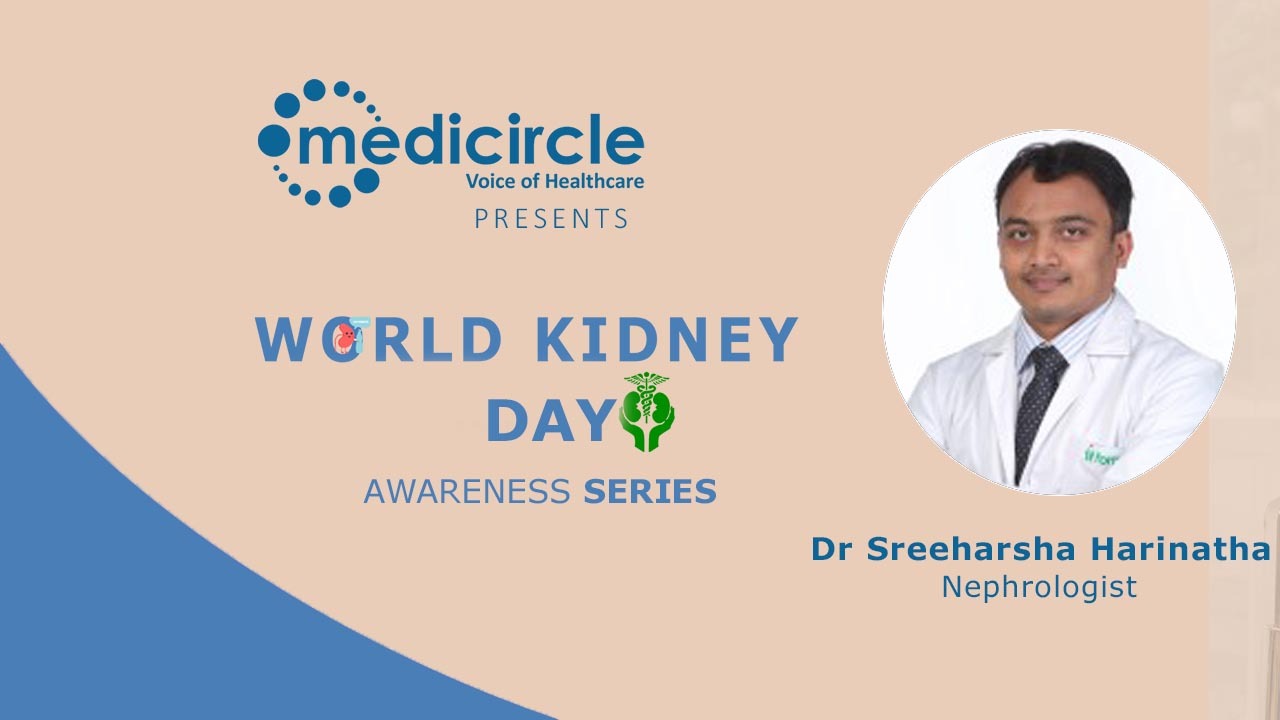Chronic Kidney Disease is a progressive condition in which kidneys don't work properly as they should, to filter waste toxins and fluids from our body and this can cause serious health problems. Early recognition of chronic kidney disease could slow progression, prevent complications, and reduce cardiovascular-related outcomes. Medicircle is conducting a World Kidney Day Awareness Series featuring eminent nephrologists and urologists from different healthcare organizations to get their views on maintaining good kidney health.
Dr. Sreeharsha Harinatha is an accomplished Urologist, Robotic and Transplant Surgeon with over 15 years of surgical experience. He has expertise in the field of Robotic Surgery and Renal transplantation with a focus on Nerve Sparing Robotic Radical Prostatectomy, Nephron Sparing Robotic, and Laparoscopic Renal Surgery and Kidney transplant.
Varied Spectrum of Symptoms for Unhealthy Kidney
Dr. Harinatha emphasizes, “Symptoms of an unhealthy kidney can have a varied spectrum like a person may be asymptomatic, or have overt symptoms. So, a patient might have a mild chronic disease, but he may have a lot of symptoms, but some people with advanced chronic disease may not have any symptoms. So, that is the reason why we have to be careful with even the mild symptoms and get it checked.”
He further informs, “So, if we talk of what are the symptoms of unhealthy kidney, then most commonly we can see swelling in the ankles or puffiness around the eyes, that is because when the kidneys are affected, they are unable to push out the extra sodium in the body and there will be sodium retention and there will be protein loss as well. So that leads to retention of fluid and that leads to swelling around the ankles and puffiness around the eyes. And even the patient sometimes will notice some blood in the urine or some pain that can be a representation of stones in the kidney, which need to be checked or diagnosed. Sometimes they would have foaminess in the urine and that can be because of loss of protein in the urine, which leads to the foamy appearance. Sometimes there can be symptoms like a person might just feel very tired or have a poor appetite. All these can be the presentation of chronic kidney diseases. So, it is important that if you have any of these symptoms, and if they are persistent, get it diagnosed,” Dr. Harinatha says.
Factors Causing Kidney Disease
Dr. Harinatha explains, “We see that two out of every three new chronic kidney disease patients are found to have diabetes or hypertension. So, these are the most common diseases which are affecting the patients and causing chronic kidney disease, especially diabetes is the most common cause followed by hypertension. So, it is very important to control your sugar levels and your blood pressure. There can be inflammation in the kidney, which can be because of some autoimmune diseases or polycystic kidney. There are other causes like there can be stones in the kidneys, which if left untreated can in the long run, affect kidney function. Sometimes there are even tumors in the kidneys or prostatic hypertrophy that can cause obstruction and if neglected over some time can lead to chronic kidney disease. There can also be an infection in the kidney that can lead to long-term chronic kidney disease, if not diagnosed So, these are some of the common causes,” mentions Dr. Harinatha.
Dietary Changes Required
Dr. Harinatha advises, “It's very important to take an adequate amount of fluids, drink a good amount of water, and general advice would be to drink at least two to three liters of water per day. That is for a person with normal kidneys with normal function. Of course, if somebody has already been diagnosed with chronic kidney disease, he would be advised some fluid restriction that depends on the amount of kidney function. But in general, a healthy person should take a good amount of fluids and water and of course, keep their blood sugars in check and also glycosylated hemoglobin. If you are hypertensive, you keep your blood pressure in check. For a healthy person, enough physical activity to maintain the ideal amount of weight as per your height is important. All-the-counter medications like painkillers have to be avoided unless they are absolutely necessary because if these painkillers are not used judiciously, they can cause chronic kidney disease in the long run. Do not compromise with a healthy lifestyle,” suggests Dr. Harinatha.
(Edited by Amrita Priya)

 Dr. Sreeharsha Harinatha, Urologist, Robotic and Transplant Surgeon talks about symptoms of unhealthy kidney, factors causing kidney disease and dietary changes to ensure healthy kidney.
Dr. Sreeharsha Harinatha, Urologist, Robotic and Transplant Surgeon talks about symptoms of unhealthy kidney, factors causing kidney disease and dietary changes to ensure healthy kidney.




















.jpeg)




















